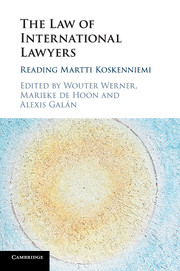Book contents
- The Law of International Lawyers
- The Law of International Lawyers
- Copyright page
- Contents
- Contributors
- Acknowledgements
- Introduction
- 1 What Moves Law?
- 2 Formalism, Realism and the Politics of Indeterminacy
- 3 Settling Disputes
- 4 Form Meets Function
- 5 Martti Koskenniemi on Human Rights
- 6 The Rule of Law in an Agnostic World
- 7 The Space between Us
- 8 The Critic(-al Subject)
- 9 Practising Law
- 10 Thinking about What International Humanitarian Lawyers ‘Do’
- 11 International Law and the Limits of History
- 12 Even the Dead Will Not Be Safe
- 13 Martti Koskenniemi and the Historiography of International Law in the Age of the War on Terror
- 14 Martti Koskenniemi's Critique of Eurocentrism in International Law
- Epilogue
- Index
- References
8 - The Critic(-al Subject)
Published online by Cambridge University Press: 25 May 2017
- The Law of International Lawyers
- The Law of International Lawyers
- Copyright page
- Contents
- Contributors
- Acknowledgements
- Introduction
- 1 What Moves Law?
- 2 Formalism, Realism and the Politics of Indeterminacy
- 3 Settling Disputes
- 4 Form Meets Function
- 5 Martti Koskenniemi on Human Rights
- 6 The Rule of Law in an Agnostic World
- 7 The Space between Us
- 8 The Critic(-al Subject)
- 9 Practising Law
- 10 Thinking about What International Humanitarian Lawyers ‘Do’
- 11 International Law and the Limits of History
- 12 Even the Dead Will Not Be Safe
- 13 Martti Koskenniemi and the Historiography of International Law in the Age of the War on Terror
- 14 Martti Koskenniemi's Critique of Eurocentrism in International Law
- Epilogue
- Index
- References
- Type
- Chapter
- Information
- The Law of International LawyersReading Martti Koskenniemi, pp. 197 - 224Publisher: Cambridge University PressPrint publication year: 2017



